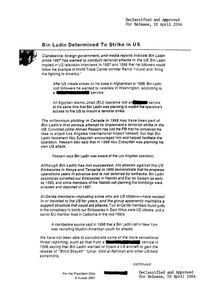Bin Ladin Determined To Strike in US
| Bin Ladin Determined To Strike in US | |
|---|---|
 The briefing | |
| Created | August 6, 2001 |
| Presented | July 22, 2004 (public) |
| Media type | President's Daily Brief |
| Subject | Terrorism threats indicating the September 11 attacks |
| ||
|---|---|---|
|
Personal 1st General Emir of al-Qaeda Works Killing and legacy |
||
"Bin Ladin Determined To Strike in US" was a President's Daily Brief prepared by the Central Intelligence Agency and given to U.S. President George W. Bush on Monday, August 6, 2001. The brief warned, 36 days before the September 11 attacks, of terrorism threats from Osama bin Laden and al-Qaeda, including "patterns of suspicious activity in this country consistent with preparations for a hijacking" of U.S. aircraft.[1]
President's Daily Brief
[edit]The President's Daily Brief (PDB) is a brief of important classified information on national security collected by various U.S. intelligence agencies given to the president and a select group of senior officials. On August 6, 2001, the Central Intelligence Agency delivered a President's Daily Brief to President Bush, who was vacationing at his ranch in Crawford, Texas.[2][3]
President Bush's response of "All right. You've covered your ass" has been erroneously linked to this PDB. This response, however, came from a separate PDB linked to Bin Laden from several months earlier. During 2001, CIA analysts produced several reports warning of imminent attacks by Bin Laden and al-Qaeda. Senior officials, including Vice President Dick Cheney and staff from Donald Rumsfeld's office at the Department of Defense, questioned whether these reports might not be deception on the part of al-Qaeda, purposely designed to needlessly expend resources in response. After reevaluating the legitimate risks of these recent reports, CIA analysts produced a report titled "UBL [Usama Bin Laden] Threats Are Real". It was after this report that the president gave that now-infamous response.[4]
Release
[edit]The content of the memo was kept secret, as with all but a handful of PDBs, until it was leaked in 2002.[2] CBS Evening News reported on the document on May 15.[1]
The PDB was declassified and approved for release to the 9/11 Commission on April 10, 2004, and was included in the commission's 9/11 Commission Report, published on July 22, 2004.[5] According to the National Security Archive, President Bush was the first sitting president to release a PDB to the public.[1]
Analysis
[edit]In response to accusations that the administration failed to act on the contents of the briefing, U.S. Secretary of State Condoleezza Rice and General Richard Myers emphasized that the CIA's PDB did not warn the president of a specific new threat but "contained historical information based on old reporting."[6][7]
See also
[edit]- Phoenix Memo, July 10, 2001
References
[edit]- ^ a b c Blanton, Thomas S. (April 12, 2004). "The President's Daily Brief". National Security Archive. Archived from the original on August 6, 2007. Retrieved August 7, 2007.
- ^ a b Thompson, Paul (2004). The Terror Timeline. HarperCollins. p. 100. ISBN 0-06-078338-9.
- ^ "Condoleezza Rice asserts 'Bin Laden Determined To Attack' wasn't a warning. sickhorses.com" on YouTube
- ^ Michael Morell, "The Great War of Our Time: The CIA's Fight Against Terrorism - from al Qa'ida to ISIS" (New York: Hatchette Book Group, 2015), p. 41
- ^ 9/11 Commission (2004). "The System was Blinking Red". 9/11 Commission Report (PDF). U.S. Government Printing Office. ISBN 0-16-072304-3. Archived from the original (PDF) on April 23, 2016.
{{cite book}}: CS1 maint: numeric names: authors list (link) - ^ Myers, Richard (2009). Eyes on the Horizon: Serving on the Front Lines of National Security. Simon and Schuster. p. 186. ISBN 978-1-4165-6031-9.
- ^ Felix, Antonia (2005). Condi: The Condoleezza Rice Story. Newmarket Press. pp. 228–229. ISBN 1-55704-675-1.
According to Felix's testimony before the 9/11 Commission, "Condi stressed that the administration did not anticipate any strikes within the country, but was focused on terrorist activities in other parts of the world. Commission member Richard Ben-Veniste brought the subject back to the memo, however, to point out that its very title pointed to a domestic attack."
BEN-VENISTE: Isn't it a fact, Dr. Rice, that the Aug. 6 P.D.B. warned against possible attacks in this country? [...]
RICE: You said did it not warn of attacks. It did not warn of attacks inside the United States. It was historical information based on old reporting. There was no new threat information. And it did not, in fact, warn of any coming attacks inside the United States.



